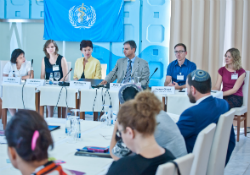Workshop on outbreak investigation and response (OIR) for respiratory infections

Darko Jovanovic
A workshop on OIR with a focus on emerging respiratory diseases, including Middle East respiratory syndrome coronavirus (MERS-CoV), for countries of the South-eastern Europe Health Network was held on 8 and 9 July 2015 in Budva, Montenegro.
The meeting, organized by WHO/Europe in collaboration with the South East European Center of Infectious Diseases Surveillance and Control (SECID) and facilitated by partners from the Robert Koch Institute (RKI), was opened by the Director of the Institute of Public Health of Montenegro, Dr Boban Mugosa, and Head of the WHO Country Office, Montenegro, Ms Mina Brajovic.
Preparedness is as important as ever
In her opening remarks, Ms Brajovic stressed that the outbreak of Ebola virus disease in West Africa, the MERS-CoV outbreak in the Republic of Korea, and the current upsurge in cases of avian influenza H5N1 in humans in Egypt were a wake-up call. In a highly mobile world, diseases spread very fast, and all countries should always be prepared for the unanticipated possibility of outbreaks of serious infectious diseases. Preparedness is as important as ever.
She emphasized that as outbreaks of infectious diseases can emerge anywhere, governments, agencies and other stakeholders need to continue exerting efforts in strengthening interconnected systems for outbreak prevention, preparedness, detection and response.
One of the conclusions of the workshop was that there have been significant developments related to public health preparedness in recent years. Member States have been implementing the International Health Regulations (IHR 2005), and reviews of lessons learnt have taken place after the influenza (H1N1) pandemic of 2009. There has also been a growing recognition that many of the components of a sound pandemic preparedness strategy could be beneficial to other types of health threats.
At the workshop, countries presented steps taken during a recent outbreak during a poster market place. Using a scenario-based exercise about an acute respiratory disease of epidemic/pandemic potential, gaps in national guidelines and the steps that will lead to a more rapid, effective and coordinated OIR were identified. Additionally, areas for synergy and a common approach for OIR in the region were discussed.
Though technological and scientific advances have improved outbreak detection and response in recent decades, many significant challenges remain in addressing outbreaks. In light of this, this OIR workshop was very timely and important as an opportunity to upgrade the outbreak and investigation knowledge and skills that would lead to better practice, as pointed out by Ms Brajovic in her welcome speech.



